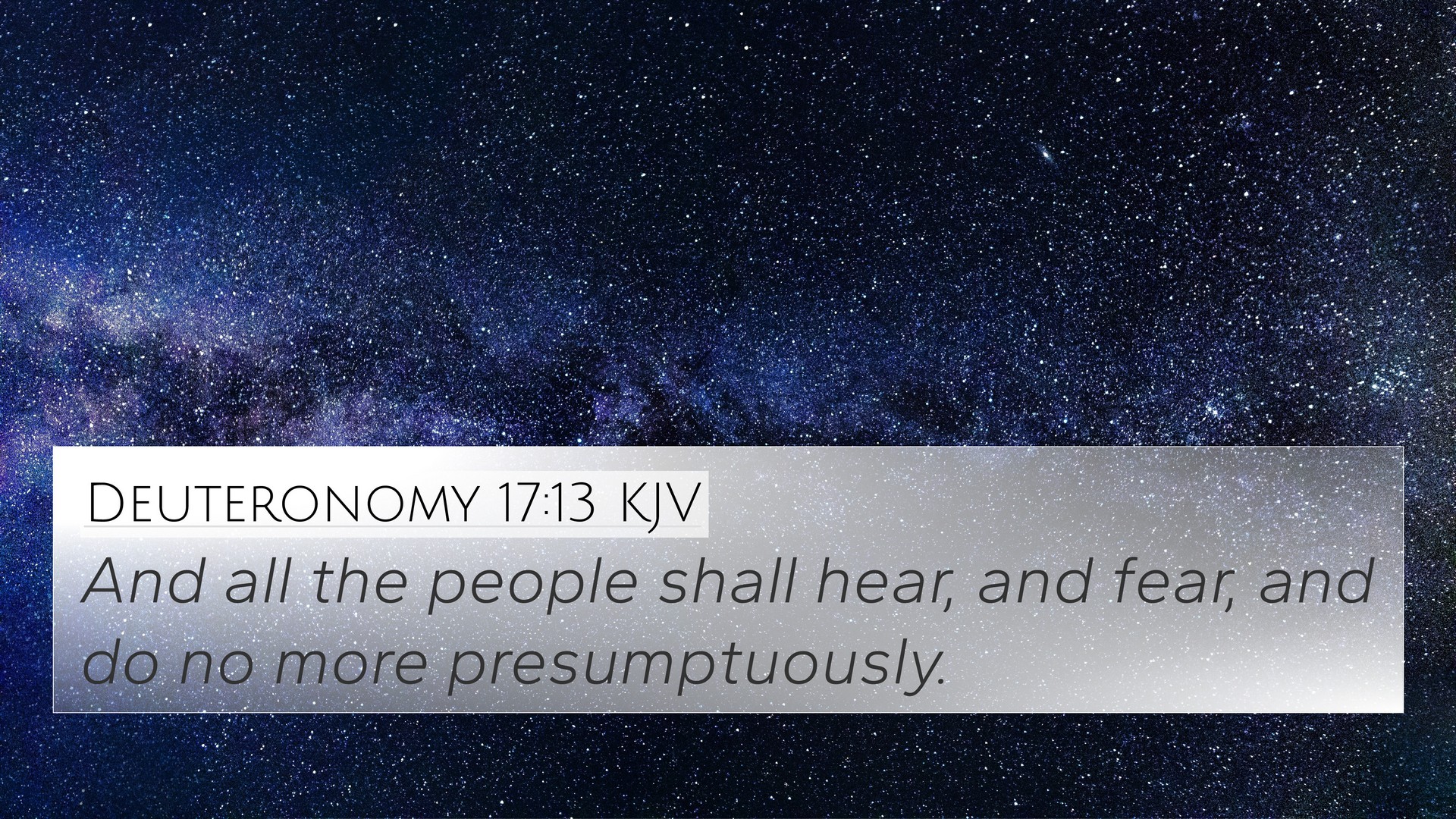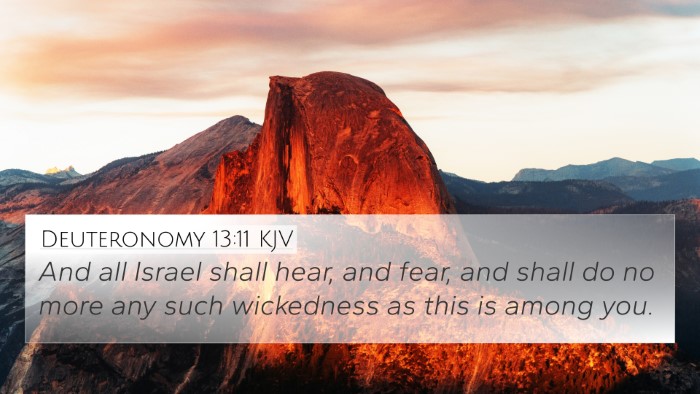Understanding Deuteronomy 17:13
Verse: Deuteronomy 17:13 - "And all the people shall hear, and fear, and do no more presumptuously."
This verse emphasizes the importance of obedience and reverence for God's appointed authorities. Slipping into rebellion or presumptuous behavior can lead to severe consequences. The context of this passage relates to the establishment of judicial systems in Israel and underscores public accountability.
Summary of Insights from Commentaries
-
Matthew Henry:
Henry interprets this verse as a call for the people to respect the judiciary instituted by God. The fear invoked here is a holy fear, driving the community towards adherence to divine laws while ensuring that the legal decisions made reflect God's holiness and justice.
-
Albert Barnes:
Barnes notes the societal implications of this admonition. When the populace acknowledges and fears the decisions of the court, it establishes a foundation for upholding the law. The acknowledgment of legal authority as divinely sanctioned fosters a communal commitment to moral order.
-
Adam Clarke:
Clarke elaborates on the consequence of ignoring God's laws. The use of "presumptuously" denotes a blatant disregard for God's commands, which results in collective disobedience. His commentary addresses the broader implications of such behavior on societal stability and divine judgment.
Connections with Other Bible Verses
This verse establishes significant cross-references within the Scripture that enhance its understanding. Here are some relevant connections:
- Leviticus 24:16: This verse discusses the sanctity of names and the consequences of blasphemy, reinforcing the awe required towards God’s law.
- Romans 13:1-2: This New Testament passage outlines the divine establishment of authority, paralleling the themes of respect and obedience found in Deuteronomy 17:13.
- 1 Peter 2:13-14: Similar principles regarding submission to governing authorities are highlighted, encouraging Christians to honor God's structures in society.
- Exodus 22:28: Here, the Israelites are commanded to not revile judges, further establishing the respect due to those serving in judicial capacities.
- Proverbs 24:21: Encourages fear of the Lord and the King, linking wisdom in governance to the awe of divine authority.
- Micah 6:8: Addresses the requirement to walk humbly with God, which can be seen as a direct application of the spirit of obedience depicted in our verse.
- Matthew 5:19: In Christ’s teaching, He emphasizes the importance of obeying and teaching the commandments, echoing the pivotal role of law in community ethics.
- Hebrews 10:31: Explores the fear of judgment, linking the reverence called for in Deuteronomy to the broader theme of accountability before God.
- Acts 5:29: Peter's declaration about obeying God rather than men elaborates on the conditions under which civil disobedience may be warranted.
- Job 28:28: "The fear of the Lord, that is wisdom," emphasizes the foundational reverence at the heart of adherence to divine law.
Thematic Connections Across Scripture
The verse invites a thematic exploration of obedience, authority, and the fear of God as it unfolds throughout both the Old and New Testaments. This theme surfaces repeatedly, interlinking various books and providing a rich context for understanding God’s expectations of His people. Observing these interconnections can enhance one's comprehension of divine law and its application in contemporary life.
Tools for Bible Cross-Referencing
Engaging with the Bible requires tools for effective cross-referencing, including:
- Bible Concordance: Assist in finding verses related to a theme or specific word quickly.
- Bible Cross-Reference Guide: A helpful resource for tracking thematic lines and direct verse connections.
- Cross-Reference Bible Study: Methods employed to explore echoing themes across different parts of the Bible.
- Comprehensive Bible Cross-Reference Materials: Collections of related verses designed for deep dives into particular doctrines or teachings.
How to Use Bible Cross-References Effectively
To decipher connections, consider the following:
- Identify Connections: Look for repeated themes or ideas across passages, such as obedience and judgment.
- Consult Reference Systems: Utilize systems that allow for easy navigation of related verses.
- Engage in Comparative Studies: Drawing parallels across books helps illuminate how New Testament writers reinterpret the Old Testament.
- Devotional Cross-Referencing: Use connections to deepen personal study and reflection. Recognizing how a verse like Deuteronomy 17:13 resonates in later scriptures encourages a holistic approach to understanding God's will.
Conclusion
In Deuteronomy 17:13, we observe a significant call to reverence and obedience that resounds throughout Scripture. The thematic connections and cross-references profoundly enrich our understanding, inviting believers to engage with God's law diligently. By employing practical cross-referencing techniques, individuals can unveil deeper insights into their faith and enrich their spiritual journeys.





